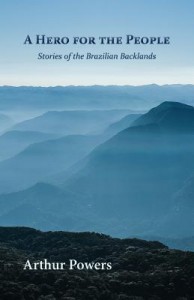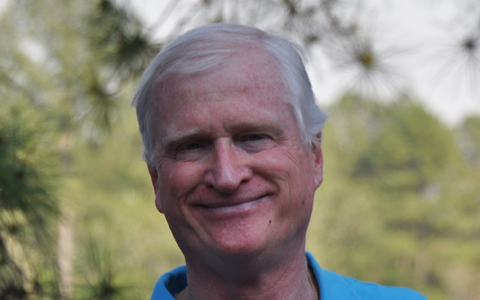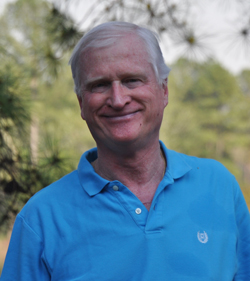 You know what’s fun? Being surprised by a really, really, REALLY good story. Or a collection of them, as the case may be.
You know what’s fun? Being surprised by a really, really, REALLY good story. Or a collection of them, as the case may be.
That happened to me recently when I read A Hero for the People, by Catholic author Arthur Powers. I couldn’t resist contacting him to find out how he handles the writing life, what inspired such a unique collection of stories, and
Arthur, tell us about what inspired A Hero for the People. I caught myself, reading it, wondering if it was a memoir and thinking I had misread that it was fiction. (That’s a high compliment to you, sir, as I don’t normally pick up memoirs to read.) Did you come up with these stories all on your own?
Thanks. The stories in A Hero For The People were written over the years we lived in Brazil. The earliest – “The Moving” – was started when I was a Peace Corps Volunteer, and was sparked by a scene I saw one day of rural people moving. I had developed a deep respect for rural Brazilians – the way they quietly, honorably went about their lives. Most of the stories were written later – a few from when I accompanied my wife in her work as a community organizer in the Rio slums, many from when we were in mission with the Franciscans in the Amazon, others from when we lived in Recife – or again in Rio.
I am a story weaver. A story may be born in many ways. I’ve woken up with full stories in my head, and in a few cases (such as “The Healer”) the outline of the story has been related to me by someone I know. But most of the stories are born from seeing a person, a group of people, a small incident, an idea. The stories have woven into them elements of our experience, of the people I know (in a general, not a specific sense) – but each story is unique, its own organism.
In most cases, for me, character is the most important element of a story. One knows (to a degree is) a certain character – knowing that character from inside – and that character interacts with other characters, or with situations. I may start a story with no idea where it is going to go; the characters live within the story – act, interact, grow.
I know you’ve written other works of fiction. How is writing a collection like this easier? Harder? Different?
I love writing short stories. They are minatures in which every word, every scene matters. There is a wholeness to them that is very satisfying.
These stories were written over the years, and most of them published separately. One, “Carla,” is an excerpt from a longer unpublished novel I have written – but stands also alone as a story. Bringing them together as a collection was natural – each story more or less took its place.
You were in Brazil for a number of years. How did that come about? Why Brazil?
When I applied to the Peace Corps, they offered me a position as a community organizer in Brazil. I knew relatively little about Brazil, but the work sounded interesting and the country intriguing. I’m not a natural linguist, and I initially struggled with Portuguese – but learned to love the language, and the people. Brazil has one of the friendliest, warmest cultures I have ever encountered.
My wife was also a Peace Corps Volunteer in Brazil (we met in the Peace Corps), so we shared a love of the country. In 1978, when I was offered a position with an international law firm in Rio de Janeiro, we both were eager to go. From that point on, most of our life was lived in Brazil.
What’s the hardest balancing act you have as a Catholic writer?
The same struggle most writers have – balancing life with time to write. When we lived in the Amazon, we were five hours by dirt road from the nearest real town (we lived in a tiny village, with a single telephone and electricity – generated by a village diesel motor – only a few hours each night). The nearest town had perhaps 20,000 people – to reach the state capital was another fourteen hours. In addition, we did a lot of rural work, involving long hours in the pickup truck.
There was no radio, no CD player. There was conversation and silence. That silence was perfect for writing – the stories would grow and develop in my mind, and I would write them down later.
Silence is this writer’s best friend. I watch almost no television, and keep mechanic/electronic noise limited (I love parties, children playing, conversations with family & friends). Perhaps one tension I have is that I love to listen to classical music, bossa nova, and vintage jazz – but at any given moment I have to choose between doing that and writing. I can’t do the two simultaneously.
How does your Catholic faith play a role in your writing practice?
Writing flows from my life. I am a person first – husband, father, grandfather, friend, worker, parishioner – and being Catholic is an integral part of who I am. For the past dozen years, my wife and I have also been involved in Catholic contemplation – silent prayer. Faith permeates my life, and my writing flows from that life.
That is not to say that my writing is about me – generally it is not. Clearly, all authors draw on their experience – what they have seen and done, the people they have known – as a background for their stories. And certain stories – most notably “Hate” and “A Hero for the People” – work with emotions and experiences we (and our many colleagues) had in mission. But my stories are not, on the whole, autobiographical – I am interested in other people: what motivates them, how they think, talk, act. People are fascinating.
If you’re interested in learning more about this book, I gushed about it last week at my blog. While you won’t find Arthur Powers on his own website, he is the force behind CatholicFiction.net and he’s also in a number of other places online.
Sarah Reinhard is a Catholic wife, mom and author whose nose is probably in a book if she’s not scraping something off of her shoes. Her latest book is A Catholic Mother’s Companion to Pregnancy: Walking with Mary from Conception to Baptism. Check out all of her books at http://sarahreinhard.com/writing/my-books/.
Visit Sarah’s website: http://sarahreinhard.com/
If you liked this article, please share it with your friends and family using the Share and Recommend buttons below and via email. We value your comments and encourage you to leave your thoughts below. Thank you! – The Editors














